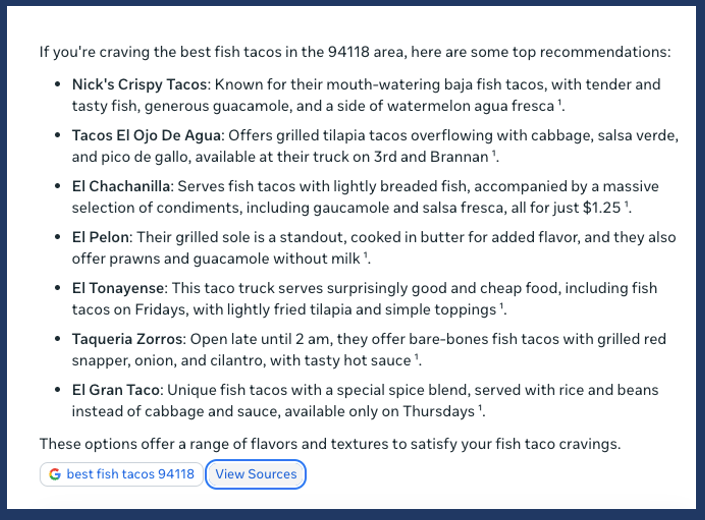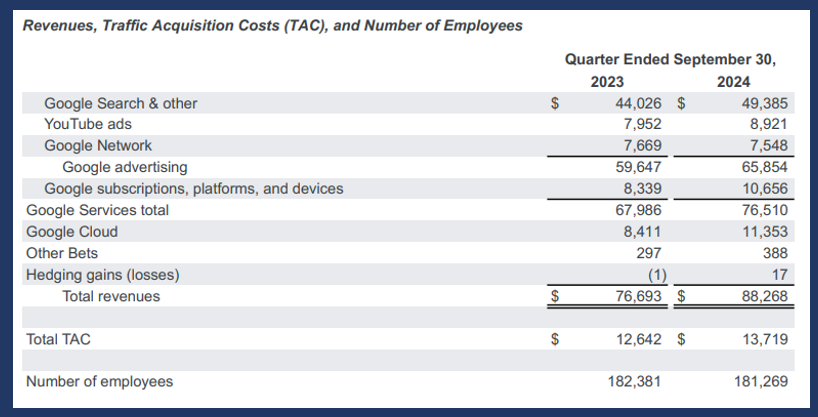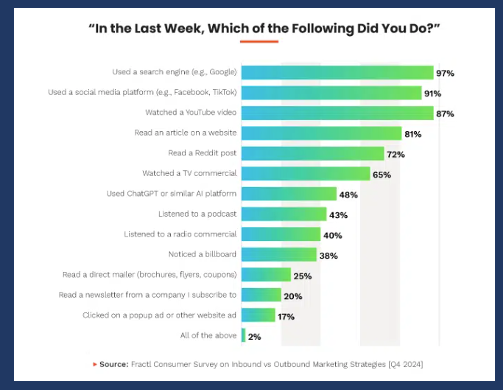Meta AI Search, Google Q3 Mo, 97% vs. 48%

Please read this message about Near Media's future.
Meta's AI Search Engine
Meta is reportedly building a new search engine for its "conversational assistant" AI chatbot, according to The Information. The stated reason is to reduce its dependance on Bing and Google, which currently provide its search results. The company has been crawling the web to train LLMs, but apparently also to create a new search index. This decision appears to be strategic and not just about cost savings. The chatbot is now deployed across Meta properties: WhatsApp, Messenger, Instagram, Ray-Ban Meta smart glasses and AR headsets. A proprietary search capability that Meta can better control makes sense in this new conversational AI environment. I directly asked Meta.ai about the company's forthcoming search engine; it told me there would be integration with multiple properties and that UGC and reviews would also be indexed. However it later qualified this statement as an "educated prediction based on publicly available information." The inclusion of content from Facebook and Instagram – local product, hospitality, travel and service recommendations – would make this a very interesting tool. Separately, Facebook recently announced a new Local tab that "pulls together the best local content from across Facebook – from places like Marketplace, Groups and Events – into a single tab called Local." Meta's also part of the Overture Maps Foundation, open-source mapping project. Presumably, all that data would be available via this new search engine as well.

Our take:
- Fifteen years ago there were multiple Q&A services including Facebook Questions, which was short lived. This is a sort of 2.0 version.
- Any Meta search tool is unlikely to directly challenge Google but it could provide a useful alternative on Meta's various properties.
- And the inclusion of Facebook, Instagram and mapping content could make the Meta conversational assistant a pretty useful local search tool.
Google's Q3 Momentum
Despite a wide range of legal setbacks and growing competition Google had a very good Q3, handily beating Wall Street Expectations. The company reported $88.3 billion in total revenue, up 15% year-over-year. Ad revenue came in at $66 billion; search advertising (and "other") brought in $49 billion and YouTube generated $9 billion. But the real star was Google Cloud, which saw 35% growth and $11.4 billion in revenue. Ruth Porat, who brought a Wall-Street focus to the company, is giving up her CFO role to become president and chief investment officer. Her successor, Anat Ashkenazi, previewed more layoffs in her introductory remarks on the earnings call. Also on the call, CEO Sundar Pichai made this statement (which is getting lots of attention): "Today, more than a quarter of all new code at Google is generated by AI, then reviewed and accepted by engineers" (read: more layoffs coming). Additional highlights include Waymo's momentum (150K paid rides weekly), AI Overviews in 100 countries (now with more ads) Gemini integration into Maps and across major products – and Maps now has 2 billion monthly active users.

Our take:
- Despite impressive Cloud growth, Search Ads remain the biggest revenue contributor. This was the highest ad-revenue quarter Google to date.
- Google seems to be trying to grow its cloud business partly by going after Microsoft, with apparent dirty tricks and unethical tactics.
- Google has rapidly integrated AI across its products and organization, partly to thwart any structural antitrust remedies.
Google vs. ChatGPT: 97% vs. 48%
One of the debates surrounding AI and ChatGPT in particular is: will it impact Google? There's a seeming conflict between consumer surveys and traffic/query volume data. Surveys suggest Google is vulnerable and seeing defections; traffic data seem to contradict that. And Google's Q3 results argue the company is very healthy and not seeing any obvious usage erosion. It saw it's highest ad revenue quarter to date. Now, a new survey from agency Fractl (n=1K adults) shows that Google remains dominant but that ChatGPT is gaining ground. (Separate source: ChatGPT referral traffic has tripled in the past two months.) According to the survey, 97% of respondents used Google in the past week, 91% used social media, while 48% used ChatGPT. OpenAI said this week that ChatGPT has more than 250 million weekly active users. The Fractl survey found that 16% of respondents used ChatGPT daily, and 19% used it weekly. Younger people tended to be more frequent users of ChatGPT. The question is whether these ChatGPT users are substituting it for Google or using it for different purposes in parallel with Google? In other words, is it a search replacement or simply additive?

Our take:
- Andrew Shotland investigates the state of local search on ChatGPT and finds it pretty weak. Nobody can touch Google's local knowledge graph.
- There's lots of anecdotal evidence that people who use AI tools heavily are using Google less. That was also reflected in a recent survey from Tinuiti.
- Any substitution of ChatGPT for Google is probably happening at the top of the funnel and not the bottom, minimizing the ad revenue impact.
Recent Analysis
- Near Memo episode 180: A conversation with Raj Singh, founder of Soloist.ai, an AI-powered website builder.
Short Takes
- Why local reviews are so important.
- AI Overviews showing up for more than 50% of real estate queries.
- Google tests new local comparison UI, inspired by EU regs.
- Backstory of UK's Foundem, which won its antitrust suit against Google.
- Boosted by Google, Reddit has 100M users and just turned first profit.
- An overview of Google SERP verticalization and personalization.
- France: court orders Google to pay $29M in ads antitrust case.
- At its creator summit, Google tells small HCU "victims" to move on.
- A first person account (mixed) of the Google creator summit.
- New AI "Search Bidding Exploration" expands ad reach and G revenue.
- Some independent retailers are thriving despite Amazon's dominance.
- Amazon top-of-funnel starting point for shoppers, Google far behind.
- Big Tech's hidden influencers and lobbyists try to undermine EU regs.
Listen to our latest podcast.

How can we make this better? Email us with suggestions and recommendations.

